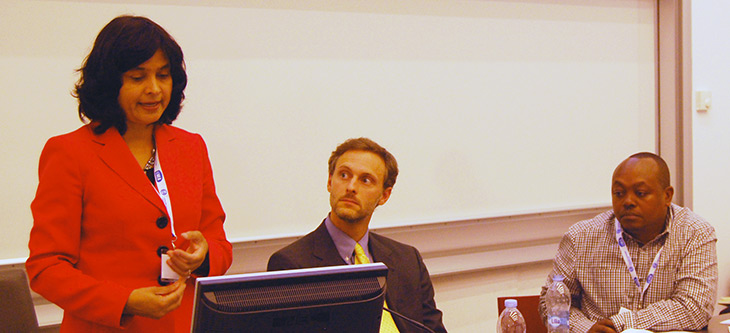The Health Policy Project ended in 2016. Work continued under Health Policy Plus (HP+) until 2022.
NEWS & VIEWS

Suneeta Sharma, HPP project director; Taylor Williamson, director, health governance, HPP/RTI; and Thomas Maina, senior health financing advisor for HPP/Kenya presenting at satellite session.
July 16, 2015
MILAN, Italy—Decentralization is changing health systems. By bringing decision making closer to citizens, experts believe that governments will be more responsive and accountable to their populations. In an International Health Economics Association satellite session on July 12, the Health Policy Project (HPP), funded by USAID, presented new ways of thinking about why and how decentralization occurs. “Decentralization in Health Care: Diffusion or Confusion?” brought together panelists from HPP’s headquarters in Washington and the HPP Kenya office with a crowd of 50 representatives of multiple sectors, including participants from the World Bank, national ministries of health, and academia.
The session disentangled the various interests behind decentralization efforts, describing the motivations of key health sector actors, their reactions to political and economic incentives, and the outcomes achieved by reforms. Thomas Maina, senior health financing advisor for HPP discussed the project’s experience in Kenya, analyzing the reforms undertaken by the government during the recent decentralization process. He identified political economy challenges to the Kenyan experience, to help participants understand how the promises and perils of decentralization have been realized. Maina also highlighted new budget and expenditure analyses in the country showing that even though 35 percent of funding devolved to the counties came from the health sector, they only allocated 21 percent of their revenue to health in 2014.
There was lively debate among expert participants during the event’s fishbowl session, where participants were asked to discuss decentralization in their country contexts. Edwine Barasa from the Kenya Medical Research Institute (KEMRI) discussed the implications of decentralization for Kenya’s hospitals, especially hospital management boards, which have lost their accountability mandate and funding as a result of the process. Joseph Capuno, an economist at the University of the Philippines, and an expert on decentralization in Southeast Asia, talked about the challenges of allowing local governments too much fiscal space, and how the Philippines has tried to enact minimum standards for funding and conditional grants to promote national priorities.
At the end of the meeting, HPP Project Director Suneeta Sharma summarized the session by saying that it is not anymore a question of ‘whether’ but ‘why’ and ‘how best to’ to decentralize. She noted that decentralization requires political support at all levels, as well as alignment between decentralized funding and functions.
What's New
- Something to Build On: “Innovation Exchange” Celebrates the Health Policy Project’s Close and a New Beginning
- What Will it Take for Tanzania to Achieve ART Targets and Ensure Long-Term Sustainability of the HIV Response?
- Helping Kenya’s County Leaders Advocate for Increased Health Investments
- HPP Holds Working Meeting on Ensuring Responsible PEPFAR Transitions for Key Populations
- Health Policy Project Celebrates 2016 International Women's Day
- HPP Staff Participate in White House Conference on HIV Stigma Reduction

